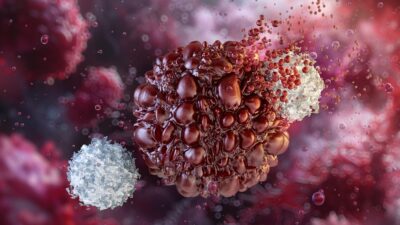Using a Natural Antibody to Combat Atherosclerosis

Researchers at the University of California San Diego School of Medicine have shown that they can block inflammation in mice, thereby protecting them from liver disease and hardening of the arteries while increasing their healthy lifespan.
The study, published in the journal Nature, shows that inflammation can be blocked using a naturally occurring antibody that binds with oxidized phospholipids (OxPL), molecules that are located on the cell surface and are modified by inflammation [1]. This is the first time in a living animal that OxPL has been shown to trigger inflammation that leads to the formation of arterial plaques, the foundation of heart disease.
The mice were given a high-fat diet and treated with the antibody, which prevented artery-hardening arterial plaques from forming, prevented liver disease, and increased their lifespan. The study results also highlight a potential new approach to preventing or reversing a variety of inflammatory diseases.
The researchers observed that whenever there is inflammation, there is OxPL. While this fact does not suggest that OxPL is the cause, the researchers knew that it has an important role in that process and the resulting diseases. Phospholipids are molecules that form the cell membrane, and they are prone to modification from reactive oxygen species, thus forming OxPL. This happens in inflammatory diseases such as atherosclerosis, in which plaques form and block the arteries, leading to heart attack and stroke.
For a disease model, the research team created specially engineered mice with a genetic mutation that made them prone to atherosclerosis. They also generated a piece of a naturally occurring antibody called E06 that could bind to OxPL and prevent it from causing inflammation in immune cells. They then gave the mice a high-fat diet, which is generally enough to encourage them to develop atherosclerosis due to their genetic mutation.
Compared to the control mice, the E06 antibody-producing mice had between 28-57 percent less atherosclerotic plaque, even a year later, while having high cholesterol. The antibody also reduced the hardening and narrowing of the aortic valves, fatty liver disease, and inflammation in the liver. The E06 mice also showed a 32 percent reduction in serum amyloid A, a biomarker of systemic inflammation.
Finally, the E06 mice lived longer than their control counterparts. After a 15-month period, all of the E06 mice were still alive, while only 54 percent of the control mice were.
The study shows for the first time that OxPL is pro-inflammatory, plays a major role in the development of atherosclerosis, and, most importantly, can be countered using the E06 antibody. This suggests that therapies that reduce the activity of OxPL could prove useful in reducing inflammation while helping to combat atherosclerosis and similar diseases. The researchers are now testing the E06 antibody in mouse models of other inflammatory diseases, including osteoporosis and nonalcoholic liver disease.
Conclusion
The effective control of pro-inflammatory processes that encourage the development of atherosclerosis is very welcome news. Should these researchers successfully develop an E06 antibody therapy for people, it may be a solution to combating heart disease.
This is one of a number of approaches currently being explored by researchers to address atherosclerosis, so hopefully, we may have more effective methods in the near future.
Literature
[1] Que, X., Yeang, C., Hung, M. Y., Yamaguchi, F., Diehl, C. J., Gonen, A., … & Mellon, P. L. (2016). Oxidized Phospholipids Are Proinflammatory and Proatherogenic.







